
"A merchant shall not be carried away." 160th anniversary of Savva Morozov’s birth.
/ Главная / Russkiy Mir Foundation / Publications / "A merchant shall not be carried away." 160th anniversary of Savva Morozov’s birth."A merchant shall not be carried away." 160th anniversary of Savva Morozov’s birth.
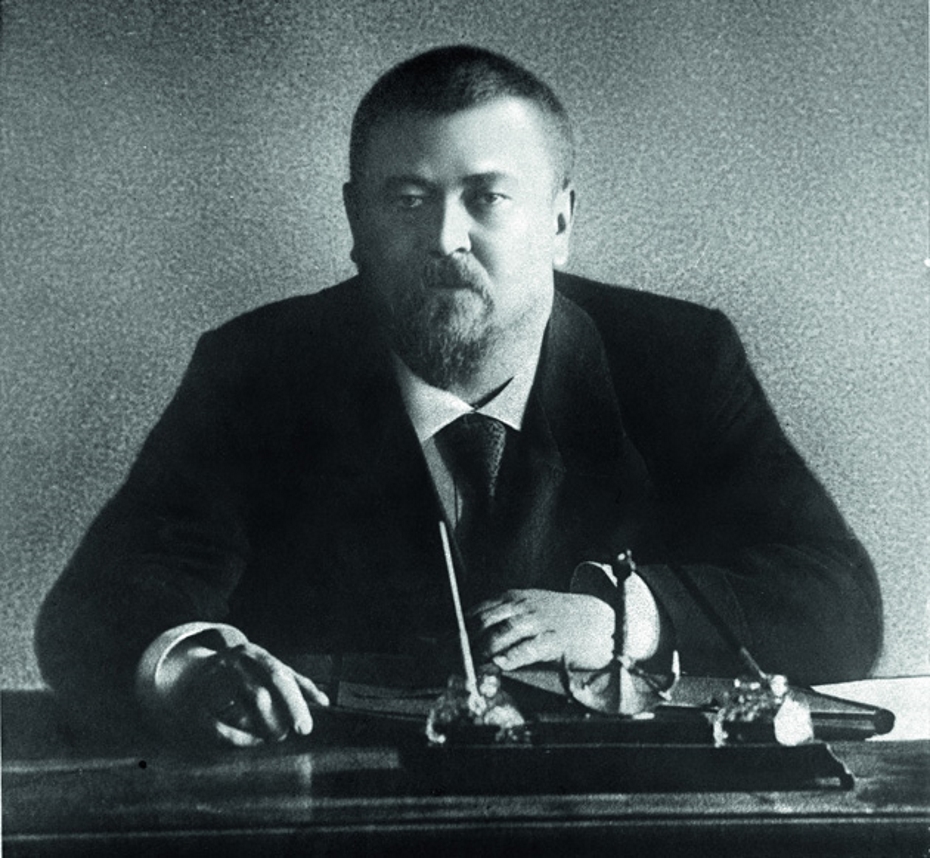
Savva Morozov
He was a multimillionaire and one of the wealthiest people in Czarist Russia. He was a chemist who developed dyes to be used in production and a capitalist who introduced modern technology. He was also a philanthropist who built hospitals and homes for workers. as well as a patron of the theater. He was a sponsor of revolutionaries and donated huge amounts of money to the Bolshevik newspaper Iskra. He used to shelter terrorists in his house. He was a man with an unusual life and mysterious death that has become a subject of legends. This man's name was Savva Morozov.
From serf to millionaire
In the early twentieth century, there were about twenty dynasties of major industrial millionaires in the Russian Empire. Savva Morozov's name was the most acclaimed and well-known among those merchant clans. His textile company, the Nikolskaya Manufactory, was reputed as one of the most profitable in the country. It was awarded numerous diplomas and medals for the excellent quality of its products at various exhibitions. He was deeply fond of the business he was engaged in and gave it nearly all his time. He even rephrased the famous expression by Descartes, "I think, therefore I am." Savva Morozov stated, "I work, therefore I am. It is evident to me that only work expands and enriches the world and my consciousness."
However, his grandfather was a serf from an Old Believer family. Savva Morozov was the one who set the stage for the big merchant clan of the Morozovs. He used to work as a weaver at a weaving factory in the village of Zuyev of Moscow Governorate. Over time, the entrepreneurially-inclined worker set up his own home workshop. The famous Moscow fire of 1812 assisted him in his efforts as many weaving factories burned down in Moscow back then. Thus, the demand for fabrics saw tremendous growth.
Initially, the grandfather of the millionaire-to-be was the one who delivered chintz and calico at the doors of Moscow's residents. However, soon the production volume increased so much that he managed to open a factory of his own. Then he bought out himself and his family from a landowner. He paid 17,000 rubles which was a huge amount at that time. So the foundation of the Morozovs' future wealth was laid. At the time of his death, Savva Morozov owned a multi-million fortune.
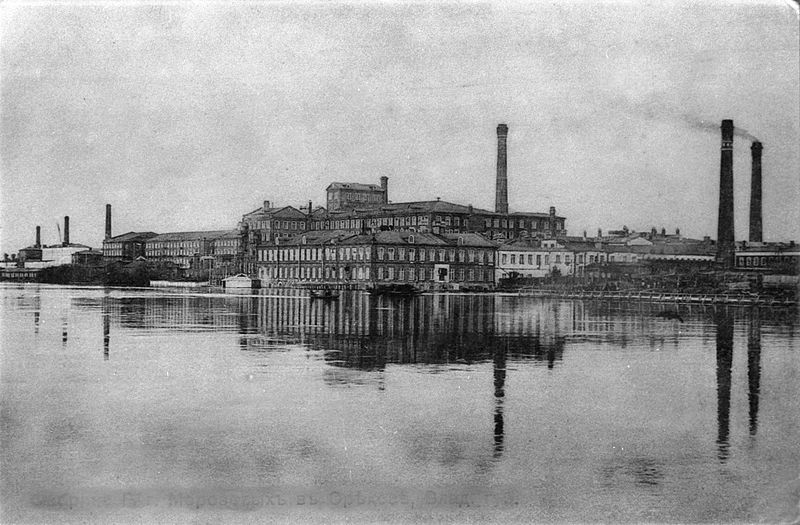
The Nikolskaya Manufactory, late 19th century. Photo credit: wiki2.org
Timofei Morozov, the eldest son of the clan founder, became head of the Nikolskaya Manufactory. Yet, he left his mark in the factory history as one of its most cruel and merciless managers. Wages at his factory were minimal. The workers were partly paid by cheques that could only be redeemed at the factory's stores. In the case of even the least faults, supervisors used the penalty scheme, so often the tiny salaries were withheld completely. A working day in the factory lasted 12 to 14 hours. Furthermore, workers often had to work even on church holidays.
No wonder the first major industrial protest in Russia took place at the Nikolskaya Manufactory, it is known as the Morozovskaya Strike. The workers' revolt made such an indelible impression on Timofei Morozov that he spent a month in bed with a fever. After that, he did not want to do anything for the factory and handed the whole management over to his wife.
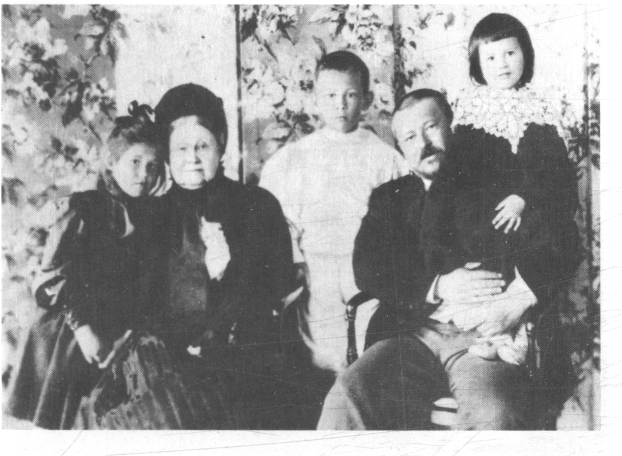
Savva Morozov with his mother Maria and children. Photo from the book My Grandfather Died Young
Savva Morozov turned out to be the polar opposite of his father. He fundamentally changed all the practices at the factory, thus making his parent angry in the beginning. The latter used to call him a socialist, which was not far from the truth.
Savva Morozov was an educated entrepreneur. He entered the physics and mathematics department of Moscow University. In parallel, he studied chemistry and developed dyes for fabrics. He also attended lectures on philosophy, history, and political economics. He continued his education in chemistry at Cambridge and even completed his dissertation.
Savva Morozov made fundamental changes in the whole work and remuneration system right away. He canceled fines, ordered advanced weaving equipment from England, sent workers for technical training. The most literate workers were employed at his factory. Savva Morozov built a hospital for his workers. It is still known as the Morozovskaya Hospital. Cows and chickens were kept to supply fresh food to the hospital, as well as the almshouse and the orphanage affiliated with it.
The new manager introduced a 9-hour workday and set fixed wage rates. shared households and cheap houses with individual quarters were built for the workers. Pregnant women were provided with paid leave. Furthermore, Savva Morozov wanted his workers to enjoy their leisure time in pleasing surroundings. That is why a beautiful park was built outside of the workers' settlement. It was the place where workers had open-air celebrations with songs and dances on holidays. At weekends, the park stage hosted an invited orchestra and well-known artists.
The factory workers adored their master. They affectionately called him Savvushka. Truth be told, initially, the parents of this overly democratic entrepreneur believed that all his ventures would only result in financial losses. To their surprise, the Nikolskaya Manufactory grew into one of the most successful factories having overbalanced its manager's investment by several times.
It is important to note that the success of his factory was not the only thing that was of interest and concern to Savva Morozov. Being the chairman of the Nizhny Novgorod Fair, he said in his opening address the prophetic words, "The richly blessed Russian land and generously talented Russian people should not be tributaries of foreign treasuries and foreign nations... Russia should and can be one of the top industrial countries in Europe because of its natural riches, because of the exceptional resourcefulness of its people, and because of the remarkable endurance of its workers.”
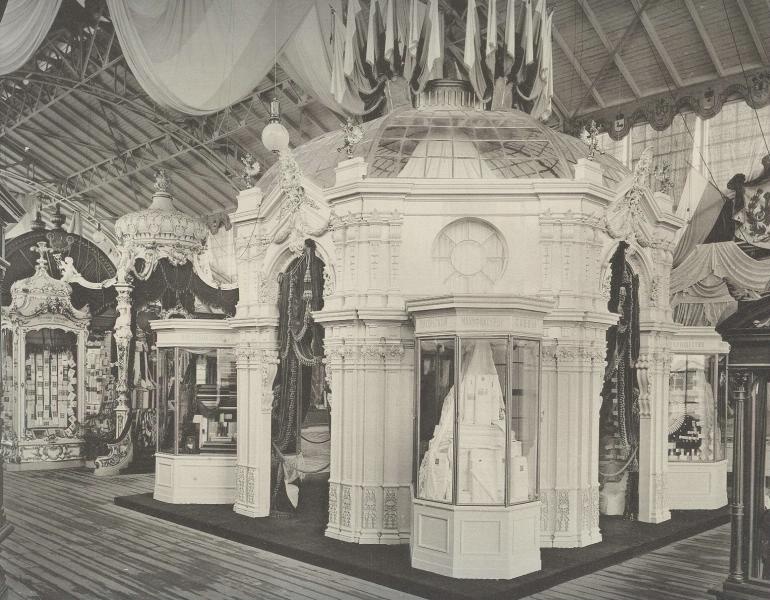
The 16th All-Russian Industrial and Art Exhibition in Nizhny Novgorod. The Association of Nikolskaya Manufactory of Savva Morozov, Son & Co (9 June 1896 - 13 October 1896). Photo by Maxim Dmitriev. Photo credit: russiainphoto.ru
Love and revolution
There were other turmoils in Savva Morozov's life besides his work. His great love marriage turned into a scandal. Savva stole the wife from his first cousin once removed having forced her to divorce him. Apparently, it was his strong temper that required the desires to come true right away, and any obstacles in the way were to be overcome.
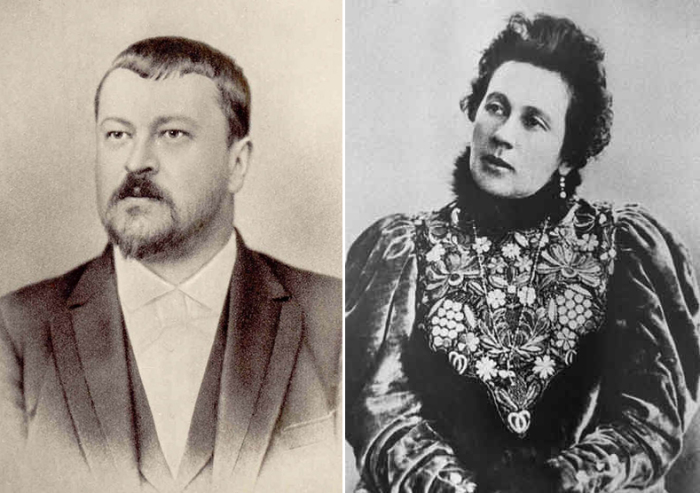
Savva and Zinaida Morozov. Photo credit: https://kulturologia.ru/
However, Savva Morozov was lucky in his work only. All his other pursuits brought pain and keen disappointment. As to his family life, the spouses very quickly became indifferent and cold to each other. The millionaire built a luxurious neo-Gothic palace on Spiridonovka Street for his wife. She took interest in dancing parties and fancy items only, while Savva Morozov was indifferent to them and could walk in worn-out shoes for years.
Having faced disappointment in love, Savva Morozov became interested in theater. He had known Konstantin Stanislavsky from secondary school, so he donated an enormous amount of money for the construction of a new building for the Moscow Art Theater. Savva Morozov even developed the appropriate paint for the electric bulbs used on the stage. Later on, he carried furniture and hung pictures while decorating the finished premises.
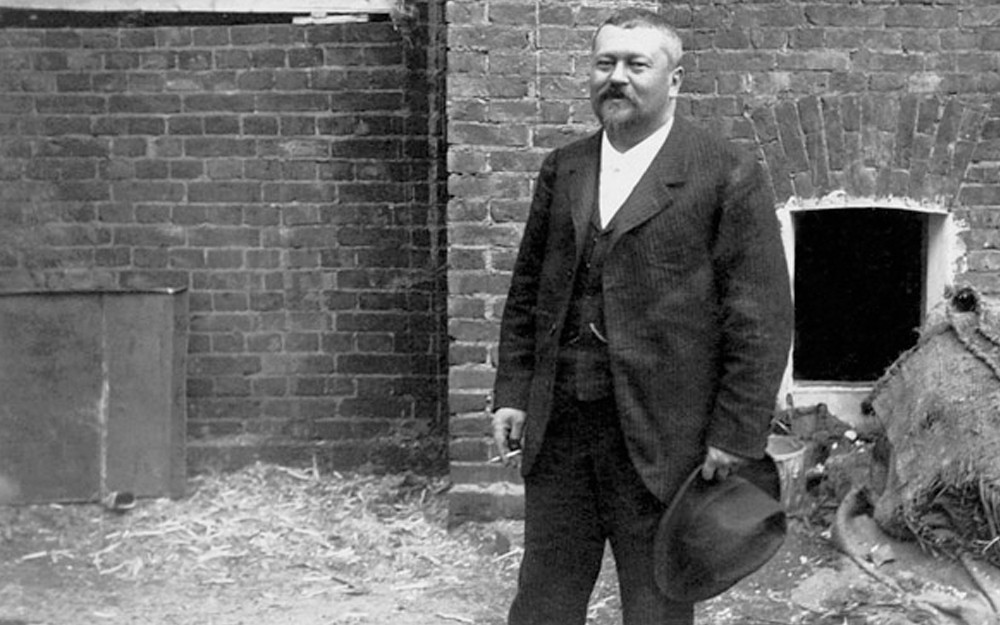
Savva Morozov at the construction site of the Moscow Art Theatre, 1901 - 1902. Photo credit: Museum of the Moscow Art Theatre
The theater was the place where he met Maria Andreeva, his new love that turned out to be fatal for him. She figured out how to channel Savva Morozov's intense vitality and enormous capital for the benefit of the approaching revolution. Thus, the Russian capitalist's money was used for the purpose of overthrowing the existing regime.
He financed Iskra, a Bolshevik newspaper. His money was used to buy weapons for terrorist attacks and forged passports for revolutionaries. He once provided shelter for the famous revolutionary Nikolay Bauman in his mansion on Spiridonovka. It might sound incredible but Savva Morozov himself brought revolutionary literature to his factory and distributed it.
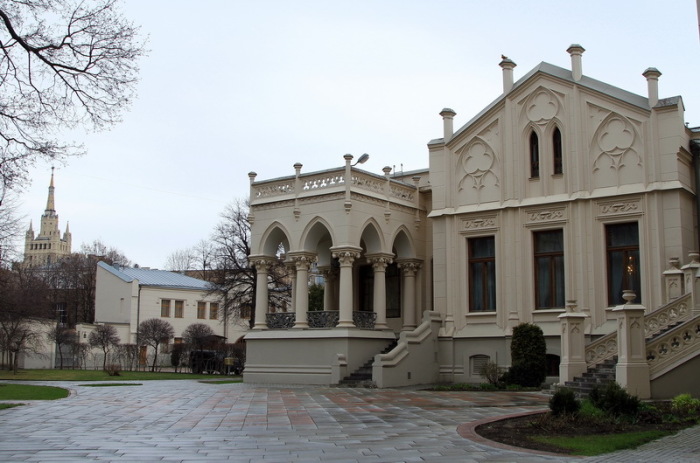
The Morozovs' Mansion on Spiridonovka (designed by F. Schechtel). Photo credit: https://kulturologia.ru/
Nevertheless, his friendship with the revolutionaries turned out to be a total disappointment. Maria Andreeva broke up with him and got in with the writer Maxim Gorky. The revolutionaries used the capitalist with progressive views as a cash cow to get money for their needs. Having realized the threat that the terrorist revolutionaries posed to the country, he ceased to finance them.
It was after the Bloody Sunday of 1905 that Savva Morozov finally realized that the country needed serious changes. He wrote a memo "On the Causes of the Strike Movement. Requirements for the Establishment of Democratic Freedoms." He defended the workers' rights to freedom of speech, the printed media, education, and the inviolability of the individual. He believed that workers' legitimate demands to improve their situation could be transformed into peaceful forms of resistance under the above conditions, which would only facilitate the development of the industry.
However, Savva Morozov's ideas were not heard. When strikes broke out at the Nikolskaya factory, the entrepreneur's mother, who owned the factory on paper, refused to settle for a compromise proposed by her son. They attempted to declare Savva Morozov insane, while he was in the deepest depression because of his disappointment in people and life.
He and his wife went to Cannes for medical treatment. A few days later he was found fatally shot in his hotel room there. The death of the well-known and rich person was surrounded by legends right away: the official version was a suicide, while unofficial speculation suggested that he had been murdered by his former revolutionary friends. The most bizarre version claimed that Savva Morozov was in fact alive, and the closed coffin was either empty or there was someone else in it.
Furthermore, for some reason, Savva did not leave his accounts, including the overseas ones, to his family but rather to a distant relative who resembled him very much. There was also a legend circulating among the workers of the Nikolskaya factory that their good master was not dead. According to it, he was secretly visiting the factories and teaching the workers wisdom. Allegedly, there was a grave with the name of Savva Morozov and date of death - 1929 on one of the Old Believers' cemeteries in St. Petersburg. It was there until 1967.
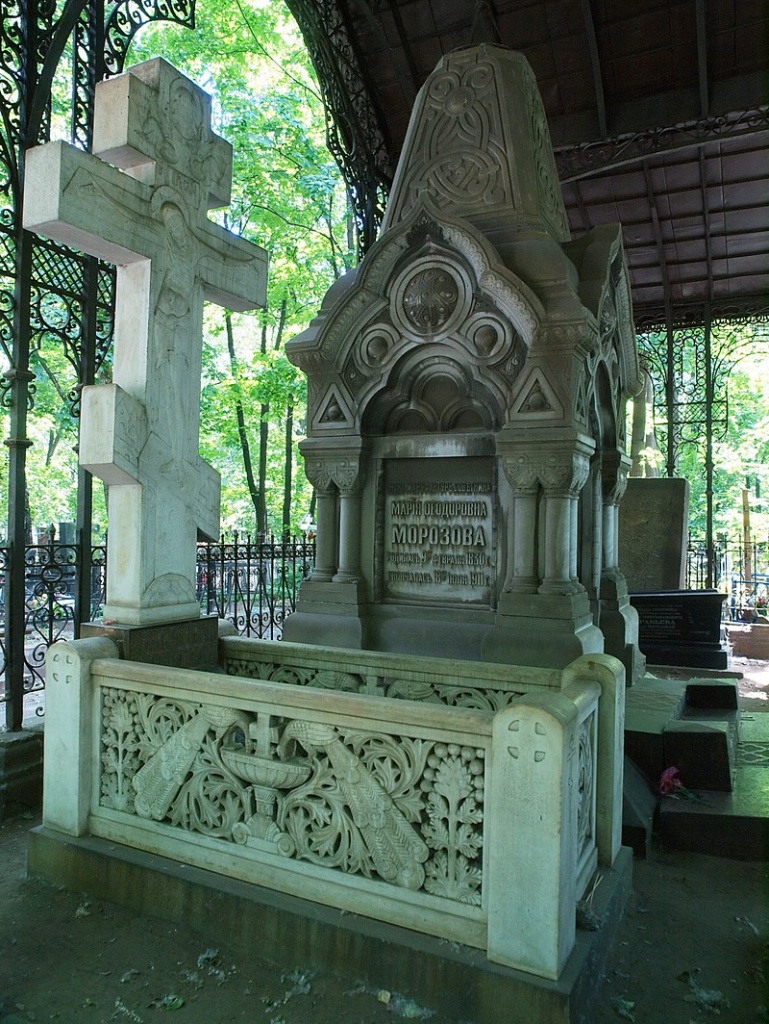
Family burial site of the Morozovs at the Rogozhskoe cemetery, Moscow. Photo credit: NVO / ru.wikipedia.org
“A merchant shall not be carried away. He must be true to his element, the element of endurance and calculation. Treason will inevitably lead to a tragic conflict," Soviet and Russian theatre director Vladimir Nemirovich-Danchenko wrote about Savva Morozov.
New publications

 Mikhail Kalatozov, a director who transformed the world of cinematography in many ways, was born 120 years ago. He was a Soviet film official and a propagandist. Above all, he was capable of producing movies that struck viewers with their power and poetic language.
Mikhail Kalatozov, a director who transformed the world of cinematography in many ways, was born 120 years ago. He was a Soviet film official and a propagandist. Above all, he was capable of producing movies that struck viewers with their power and poetic language.  Ukrainian authorities have launched a persecution campaign against the canonical Ukrainian Orthodox Church (UOC), the biggest one in the country's modern history. Over the past year, state sanctions were imposed on clergy representatives, searches were conducted in churches, clergymen were arrested, criminal cases were initiated, the activity of the UOC was banned in various regions of the country, and monasteries and churches were seized.
Ukrainian authorities have launched a persecution campaign against the canonical Ukrainian Orthodox Church (UOC), the biggest one in the country's modern history. Over the past year, state sanctions were imposed on clergy representatives, searches were conducted in churches, clergymen were arrested, criminal cases were initiated, the activity of the UOC was banned in various regions of the country, and monasteries and churches were seized.  When Nektary Kotlyaroff, a fourth-generation Russian Australian and founder of the Russian Orthodox Choir in Sydney, first visited Russia, the first person he spoke to was a cab driver at the airport. Having heard that Nektariy's ancestors left Russia more than 100 years ago, the driver was astonished, "How come you haven't forgotten the Russian language?" Nektary Kotlyaroff repeated his answer in an interview with the Russkiy Mir. His affinity to the Orthodox Church (many of his ancestors and relatives were priests) and the traditions of a large Russian family brought from Russia helped him to preserve the Russian language.
When Nektary Kotlyaroff, a fourth-generation Russian Australian and founder of the Russian Orthodox Choir in Sydney, first visited Russia, the first person he spoke to was a cab driver at the airport. Having heard that Nektariy's ancestors left Russia more than 100 years ago, the driver was astonished, "How come you haven't forgotten the Russian language?" Nektary Kotlyaroff repeated his answer in an interview with the Russkiy Mir. His affinity to the Orthodox Church (many of his ancestors and relatives were priests) and the traditions of a large Russian family brought from Russia helped him to preserve the Russian language.

 The leaders of the Friends of the Great Russia cultural association (Amici Della Grande Russia) in Italy believe that the Western policy of abolishing Russian culture in Europe has finally failed. Furthermore, it was doomed to failure from the beginning.
The leaders of the Friends of the Great Russia cultural association (Amici Della Grande Russia) in Italy believe that the Western policy of abolishing Russian culture in Europe has finally failed. Furthermore, it was doomed to failure from the beginning.  Name of Vladimir Nemirovich-Danchenko is inscribed in the history of Russian theater along with Konstantin Stanislavski, the other founding father of the Moscow Art Theater. Nevertheless, Mr. Nemirovich-Danchenko was a renowned writer, playwright, and theater teacher even before their famous meeting in the Slavic Bazaar restaurant. Furthermore, it was Mr. Nemirovich-Danchenko who came up with the idea of establishing a new "people's" theater believing that the theater could become a "department of public education."
Name of Vladimir Nemirovich-Danchenko is inscribed in the history of Russian theater along with Konstantin Stanislavski, the other founding father of the Moscow Art Theater. Nevertheless, Mr. Nemirovich-Danchenko was a renowned writer, playwright, and theater teacher even before their famous meeting in the Slavic Bazaar restaurant. Furthermore, it was Mr. Nemirovich-Danchenko who came up with the idea of establishing a new "people's" theater believing that the theater could become a "department of public education."  "Russia is a thing of which the intellect cannot conceive..." by Fyodor Tyutchev are famous among Russians at least. December marks the 220th anniversary of the poet's birth. Yet, he never considered poetry to be his life's mission and was preoccupied with matters of a global scale. Mr.Tyutchev fought his war focusing on relations between Russia and the West, the origins of mutual misunderstanding, and the origins of Russophobia. When you read his works today, it feels as though he saw things coming in a crystal ball...
"Russia is a thing of which the intellect cannot conceive..." by Fyodor Tyutchev are famous among Russians at least. December marks the 220th anniversary of the poet's birth. Yet, he never considered poetry to be his life's mission and was preoccupied with matters of a global scale. Mr.Tyutchev fought his war focusing on relations between Russia and the West, the origins of mutual misunderstanding, and the origins of Russophobia. When you read his works today, it feels as though he saw things coming in a crystal ball...